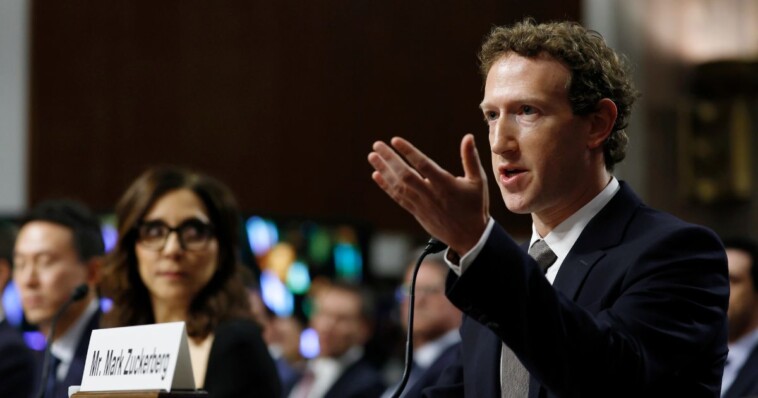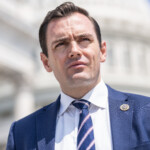
Mark Zuckerberg, CEO of Meta testifies before the Senate Judiciary Committee at the Dirksen Senate Office Building on January 31, 2024 in Washington, DC. (Anna Moneymaker / Getty Images)
By C. Douglas Golden January 8, 2025 at 6:14am
Mark Zuckerberg thinks that the move toward so-called “fact-checking” articles on Meta’s platforms — notably Facebook and Instagram — has just added to distrust and bias. That’s why he’s taking it off and replacing it with a system similar to that employed by Elon Musk’s X, on based around community notes.
The New York Times knows who’s to blame for this: Meta and Zuckerberg, because the fact-checkers say that that’s all fake news.
And people wonder why the system is on its way out.
In the five-minute speech posted to his platforms on Tuesday, Zuckerberg admitted the bloody obvious: that the “fact-checking” game was basically forced upon them by Washington, D.C., after the results of the presidential election that year.
“The legacy media pushed to censor more and more,” he said. “After Trump first got elected in 2016, the legacy media wrote non-stop how misinformation was harming democracy.”
Thus, being stretched over a barrel by Democrats in D.C. and the media, he and his company turned content policing over to the likes of PolitiFact, Snopes, and USA Today. While Snopes would end up quitting, arguing that it had a difficult time seeing the “net positive” in the arrangement, the rest of these left-leaning sources would stay on, often with hilariously bad results.
Well, that way of delineating what’s real and what’s “fake news” is on its way out.
“We’re going to get back to our roots and focus on reducing mistakes, simplifying our policies and restoring free expression on our platforms. More specifically, here’s what we’re going to do. First, we’re going to get rid of fact checkers and replace them with community notes similar to X, starting in the U.S.,” Zuckerberg said during a video statement.
Should Facebook have abandoned “fact-checking?”
“The fact checkers have just been too politically biased, and they’ve destroyed more trust than they’ve created, especially in the U.S.,” he said, adding that while global restrictions on speech had hampered social media companies, countering them “[has] been so difficult over the past four years when even the U.S. government has pushed for censorship.”
The New York Times’ headline in response: “Meta Says Fact-Checkers Were the Problem. Fact-Checkers Rule That False.”
Yes, apparently, the fact-checkers that Meta/Facebook/Instagram worked with were upset at the characterization because — get this — the Times says they claim “they had no role in deciding what the company did with the content that was fact-checked.”
In other words, it’s fake news that fact-checkers were actively policing fake news, which is the real problem. In fact, the Times seemed to imply by the very premise of the article, the problem was too little power was given to the fact-checkers, not too much.
“I don’t believe we were doing anything, in any form, with bias,” said Poynter Institute president Neil Brown. (Poynter runs PolitiFact, arguably the worst offender among the bunch, making this particularly amusing.)
“There’s a mountain of what could be checked, and we were grabbing what we could,” he added.
Of course, other fact-checkers sung a similar tune — a tune that was passed on verbatim without any (dare I say it) fact-checking by the Times.
“We did not, and could not, remove content,” said Lori Robinson, managing editor of another fact-checking partner, FactCheck.org. “Any decisions to do that were Meta’s.”
The New York Times says that, according to the fact-checkers, “Meta ultimately decided how to respond to the fact-checks, adding warning labels, limiting the reach of some content or even removing the posts.”
This is is a statement that, as PolitiFact might say, is “missing context.”
Did the fact-checkers, on their own, stipulate which content was taken off the platform? No, but it’s quite obvious what their function was: to tell the world’s largest social media company what passes muster and what doesn’t. The Democrats were so outraged in the aftermath of the 2016 election that they were looking for anyone to blame, and Facebook was a popular patsy.
While the Russians eventually became a more fashionable bogeyman, fact-checking was deemed more or less a necessity for the continued operation of Facebook and Instagram as a purveyor of news without significant interference by the government. Whatever the fact-checkers said was pretty much the law, right or wrong.
Oh, and they got a lot wrong. Remember Hunter Biden’s laptop — a story that Facebook limited the visibility of, as the U.K. Telegraph noted? They added a note saying this: “If we have signals that a piece of content is false, we temporarily reduce its distribution pending review by a third-party fact-checker.”
They also hid stories that questioned the conventional establishment wisdom regarding COVID-19, particularly its origins or its treatments.
All of this was basically solved in a single stroke with X’s community notes system, which took Elon Musk practically no time flat to implement. Zuckerberg knows a good idea when he sees one, although apparently he doesn’t know enough to have the idea. We’re still just happy that he knows when to borrow it.
That being said, the establishment media — of which, let’s be honest, the fact-checkers are obviously a part of — is lamenting the fact that fact-checkers are losing their power over social media. In the same breath, they claim they never had that power in the first place.
“Fact-checking is public service journalism, and we’re more convinced than ever that it’s needed in an increasingly busy and confusing political messaging landscape,” Lori Robinson of FactCheck.org said at the end of the blog post cited by the Times.
It didn’t do anything substantive in terms of the removal of content … and she’s “more convinced than ever that it’s needed in an increasingly busy and confusing political messaging landscape.”
If that doesn’t tell you everything you need to know about the duplicitousness of the fact-checking racket instituted by the legacy media in the wake of the 2016 elections, nothing will.
Advertise with The Western Journal and reach millions of highly engaged readers, while supporting our work. Advertise Today.




